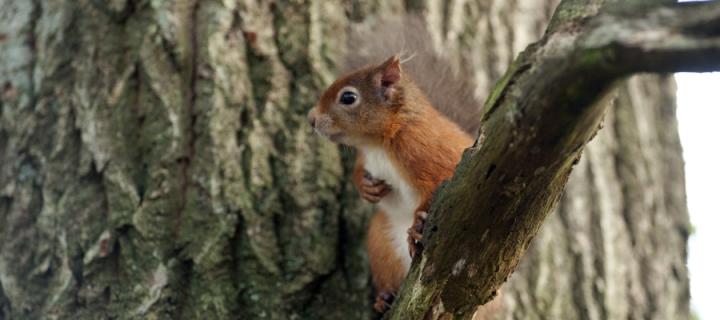Red squirrel study launched to assess scale of disease
Wildlife experts from the School have launched a project to better understand how British red squirrels are affected by a form of leprosy. The study will investigate how the disease is passed between squirrels and how conservationists can help control its spread.

The study will investigate how the disease is passed between squirrels and how conservationists can help control its spread. Leprosy was first identified in red squirrels in Scotland in 2014, caused by the bacterium Mycobacterium lepromatosis, although the disease is believed to have been present in the squirrel population for centuries.
Post-mortems have since revealed that the disease is also affecting squirrels on the Isle of Wight and Brownsea Island, off the south coast of England. The risk to people from the disease is very low. The new research study will take place on Brownsea Island, in Poole Harbour, Dorset, which is home to around 200 red squirrels. The island location allows researchers to study the impact of leprosy in a contained environment.
The disease is believed to have been present on Brownsea for many years but researchers have only recently diagnosed it as leprosy. Little is known about how the bacteria is spreading among red squirrels. The disease causes swelling and hair loss to the ears, muzzle and feet.
Researchers from the Dick Vet are working with the National Trust and Dorset Wildlife Trust on the project. Vets will use humane traps to capture the squirrels for health checks. They will take blood samples and other clinical samples for analysis before returning the animals to the wild. Red squirrels have drastically declined in the UK with fewer than 140,000 thought to be remaining on our shores. The main threat to their numbers is from habitat loss and the squirrelpox virus, which is deadly to red squirrels.
“The aim of our study is to find out how and why red squirrels catch leprosy, and how it affects both individuals and populations.
“This disease appears to have been in squirrel populations in Scotland and England’s south coast for some time. With this research, we aim to help conservationists better understand and manage the disease in this iconic species.
Brownsea Island is managed by the National Trust. A large nature reserve on the island, comprising lagoon, reedbed and woodland habitats, is managed by Dorset Wildlife Trust.
Bringing together academics and conservationists, this research project represents a significant first step towards deepening our understanding of a complex disease in British red squirrels.
Many thousands of people visit Brownsea every year, enjoying the island’s wonderful wildlife. Brownsea will remain open whilst the research project takes place.
Dorset Wildlife Trust is very pleased to hear Brownsea Island will be involved with a study of national importance. At last we may be getting closer to understanding why this much loved British species is struggling to survive. We hope that the research on red squirrels on Brownsea Island will help us to better manage and restore their remaining populations.


